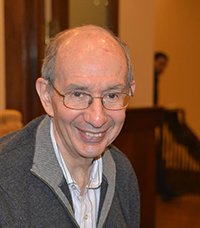Walter A. Rosenkrantz, one of the foremost experts on Markov processes and martingale theory, passed away on September 19, 2017. He was an Emeritus Professor at the Department of Mathematics and Statistics of the University of Massachusetts, Amherst.
Walter Abraham Rosenkrantz was born on March 24, 1938, in New York City. In 1951, Walter moved to Chicago, Illinois, where he attended Hyde Park High School until 1953. He began his studies at the University of Chicago in 1953, receiving a B.A. degree in June 1957 and a B.S. degree in Mathematics in December 1957—both awarded with general honors. In 1958, he entered the Graduate College of the University of Illinois as a student in the mathematics department and he completed an MS degree in Mathematics in 1959.
From 1958 to 1960, he worked as a research assistant in the Digital Computer Laboratory of the University of Illinois, and from 1960 to 1962, he was a National Science Foundation Cooperative graduate fellow in Mathematics. From 1962 to 1964, Walter was a John Wesley Young Research Instructor of Mathematics at Dartmouth College in Hanover, New Hampshire and he received his PhD in Mathematics from the University of Illinois in 1963. His thesis, Probability and Fourier Series, was advised by Professor Joseph Doob. From 1964 to 1965, he completed his postdoc at the Courant Institute. Next, Walter went on to work as an Associate Professor of Mathematics at the New York University from 1965 to 1971, before joining the University of Massachusetts Amherst in 1971, where he remained as a Professor until his retirement in 2004.
During his tenure at UMass, he worked primarily in the area of Markov processes and their associated semi-groups. He also became a Visiting Associate Professor in the Division of Mathematical Sciences at Purdue University, where he worked from 1976 to 1977. During a sabbatical leave from UMass from 1985 to 1986, he served as a Directeur Scientifique at Inria in Rocquencourt, France.
Soon after his retirement at UMass (where he served as a Professor Emeritus from 2005 until 2017), Walter and his wife Linda moved to Washington, DC. To quote Walter, he “unretired” and accepted an appointment as a Professorial Lecturer at the George Washington University from 2005 to 2012. During this time, he wrote a textbook, Introduction to Probability and Statistics for Science, Engineering, and Finance, which was published by CRC Press in 2009. According to Walter, he “retired (again) in 2012.” Describing his decision to retire after 50 years of teaching, Walter claimed he “suddenly realized that it was time to ‘pack it in’.”
Walter continued to produce articles, and was a prolific researcher. His broad area of expertise was on stochastic processes and probability theory. He specialized in and championed for the construction of martingales associated with a Markov chain using the infinitesimal generator. Later, Walter investigated problems in applied probability, mathematical statistics, and in statistics education. In applied probability, he investigated problems dealing with the mathematical and statistical analysis of traffic on modern communication networks. His focus in mathematical statistics was primarily on confidence bands for empirical distribution functions when parameters are estimated from the data.
Beyond mathematics, he was an excellent storyteller, known for his insight and great sense of humor. People who knew Walter remember his enthusiasm and wit. He was a loving husband, father, and grandfather. Walter is survived by his wife Linda, his son Mark, and his daughter Elizabeth.
—
Written by Ravi Kalpathy, Department of Mathematics, The Catholic University of America

Comments on “Obituary: Walter A. Rosenkrantz 1938–2017”